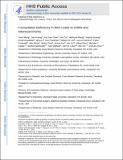| dc.contributor.author | Wang, Yiwei | |
| dc.contributor.author | Huang, Dan | |
| dc.contributor.author | Chen, Kai-Yuan | |
| dc.contributor.author | Cui, Min | |
| dc.contributor.author | Wang, Weihuan | |
| dc.contributor.author | Huang, Xiaoran | |
| dc.contributor.author | Awadellah, Amad | |
| dc.contributor.author | Li, Qing | |
| dc.contributor.author | Friedman, Ann | |
| dc.contributor.author | Xin, William W. | |
| dc.contributor.author | Di Martino, Luca | |
| dc.contributor.author | Cominelli, Fabio | |
| dc.contributor.author | Miron, Alex | |
| dc.contributor.author | Chan, Ricky | |
| dc.contributor.author | Fox, James G. | |
| dc.contributor.author | Xu, Yan | |
| dc.contributor.author | Shen, Xiling | |
| dc.contributor.author | Kalady, Mathew F. | |
| dc.contributor.author | Markowitz, Sanford | |
| dc.contributor.author | Maillard, Ivan | |
| dc.contributor.author | Lowe, John B. | |
| dc.contributor.author | Xin, Wei | |
| dc.contributor.author | Zhou, Lan | |
| dc.contributor.author | Fox, James G | |
| dc.date.accessioned | 2018-09-06T18:17:25Z | |
| dc.date.available | 2018-09-06T18:17:25Z | |
| dc.date.issued | 2016-09 | |
| dc.date.submitted | 2016-03 | |
| dc.identifier.issn | 0016-5085 | |
| dc.identifier.issn | 1528-0012 | |
| dc.identifier.uri | http://hdl.handle.net/1721.1/117652 | |
| dc.description.abstract | De novo synthesis of guanosine diphosphate (GDP)-fucose, a substrate for fucosylglycans, requires sequential reactions mediated by GDP-mannose 4,6-dehydratase (GMDS) and GDP-4-keto-6-deoxymannose 3,5-epimerase-4-reductase (FX or tissue specific transplantation antigen P35B [TSTA3]). GMDS deletions and mutations are found in 6%–13% of colorectal cancers; these mostly affect the ascending and transverse colon. We investigated whether a lack of fucosylation consequent to loss of GDP-fucose synthesis contributes to colon carcinogenesis. Methods FX deficiency and GMDS deletion produce the same biochemical phenotype of GDP-fucose deficiency. We studied a mouse model of fucosylation deficiency (Fx-/- mice) and mice with the full-length Fx gene (controls). Mice were placed on standard chow or fucose-containing diet (equivalent to a control fucosylglycan phenotype). Colon tissues were collected and analyzed histologically or by enzyme-linked immunosorbent assays to measure cytokine levels; T cells also were collected and analyzed. Fecal samples were analyzed by 16s ribosomal RNA sequencing. Mucosal barrier function was measured by uptake of fluorescent dextran. We transplanted bone marrow cells from Fx-/- or control mice (Ly5.2) into irradiated 8-week-old Fx-/- or control mice (Ly5.1). We performed immunohistochemical analyses for expression of Notch and the hes family bHLH transcription factor (HES1) in colon tissues from mice and a panel of 60 human colorectal cancer specimens (27 left-sided, 33 right-sided). Results Fx-/- mice developed colitis and serrated-like lesions. The intestinal pathology of Fx-/- mice was reversed by addition of fucose to the diet, which restored fucosylation via a salvage pathway. In the absence of fucosylation, dysplasia appeared and progressed to adenocarcinoma in up to 40% of mice, affecting mainly the right colon and cecum. Notch was not activated in Fx-/- mice fed standard chow, leading to decreased expression of its target Hes1. Fucosylation deficiency altered the composition of the fecal microbiota, reduced mucosal barrier function, and altered epithelial proliferation marked by Ki67. Fx-/- mice receiving control bone marrow cells had intestinal inflammation and dysplasia, and reduced expression of cytokines produced by cytotoxic T cells. Human sessile serrated adenomas and right-sided colorectal tumors with epigenetic loss of MutL homolog 1 (MLH1) had lost or had lower levels of HES1 than other colorectal tumor types or nontumor tissues. Conclusions In mice, fucosylation deficiency leads to colitis and adenocarcinoma, loss of Notch activation, and down-regulation of Hes1. HES1 loss correlates with the development of human right-sided colorectal tumors with epigenetic loss of MLH1. These findings indicate that carcinogenesis in a subset of colon cancer is consequent to a molecular mechanism driven by fucosylation deficiency and/or HES1-loss. | en_US |
| dc.publisher | Elsevier BV | en_US |
| dc.relation.isversionof | http://dx.doi.org/10.1053/J.GASTRO.2016.09.004 | en_US |
| dc.rights | Creative Commons Attribution-NonCommercial-NoDerivs License | en_US |
| dc.rights.uri | http://creativecommons.org/licenses/by-nc-nd/4.0/ | en_US |
| dc.source | PMC | en_US |
| dc.title | Fucosylation Deficiency in Mice Leads to Colitis and Adenocarcinoma | en_US |
| dc.type | Article | en_US |
| dc.identifier.citation | Wang, Yiwei et al. “Fucosylation Deficiency in Mice Leads to Colitis and Adenocarcinoma.” Gastroenterology 152, 1 (January 2017): 193–205 © 2017 AGA Institute Background & Aims | en_US |
| dc.contributor.department | Massachusetts Institute of Technology. Department of Biological Engineering | en_US |
| dc.contributor.department | Massachusetts Institute of Technology. Division of Comparative Medicine | en_US |
| dc.contributor.mitauthor | Fox, James G | |
| dc.relation.journal | Gastroenterology | en_US |
| dc.eprint.version | Final published version | en_US |
| dc.type.uri | http://purl.org/eprint/type/JournalArticle | en_US |
| eprint.status | http://purl.org/eprint/status/PeerReviewed | en_US |
| dc.date.updated | 2018-08-29T17:35:20Z | |
| dspace.orderedauthors | Wang, Yiwei; Huang, Dan; Chen, Kai-Yuan; Cui, Min; Wang, Weihuan; Huang, Xiaoran; Awadellah, Amad; Li, Qing; Friedman, Ann; Xin, William W.; Di Martino, Luca; Cominelli, Fabio; Miron, Alex; Chan, Ricky; Fox, James G.; Xu, Yan; Shen, Xiling; Kalady, Mathew F.; Markowitz, Sanford; Maillard, Ivan; Lowe, John B.; Xin, Wei; Zhou, Lan | en_US |
| dspace.embargo.terms | N | en_US |
| dc.identifier.orcid | https://orcid.org/0000-0001-9307-6116 | |
| mit.license | PUBLISHER_CC | en_US |
